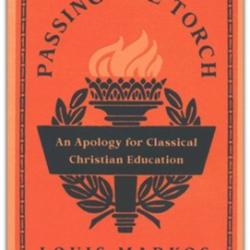The Augustinian view of human sin in Breaking Bad is not its only distinctive feature. The show contains little of the gratuitous language or sex or violence that has become the calling card of recent cable dramas. Some have claimed that cable's ability to "push the envelope" to include such things as beheadings and perpetual profanity for the sake of realism is an inherent good. But Breaking Bad doesn't take this approach. There's nothing done for cheap shock value.
Breaking Bad is also striking for sketching out a world that although dark, is morally ordered. In contrast, many other critically acclaimed dramas are essentially amoral. They tend to depict moral considerations as either irrelevant or simplistic, suggesting that life is too complicated to be constrained into categories of "good" and "bad." When they do show human shortcomings, they're often explained as the product of social construction. But Breaking Bad refuses to treat its characters with condescension. The well-educated Walt, the high school dropout drug peddler, and everyone in between are portrayed as moral beings—not exclusively as the products of their backgrounds.
Finally, Breaking Bad doesn't take the by-now popular route of mocking or dismissing the virtues held by some of its viewers. For decades, secular popular culture has responded to traditional virtues such as duty, work, fidelity, and the protection of family with winks and sneers. Consider, for example, the attitude toward work expressed in The Wire, set in inner-city Baltimore. Many of the show's characters speak of work as part of "the game" rigged by distant, powerful figures. Laborers, politicians, and drug dealers alike are all portrayed as simply trying to get theirs in a cruel economy.
But it's not just secular culture that has had an uneasy relationship with traditional virtues. In recent years, many evangelicals have taken to questioning these things because of the way they can lead to idolatry. To be sure, idolatry is a real danger, but when this approach is taken to extremes, the result is that any focus on work, on productivity, on creativity, on parental authority, or on one's reputation becomes sinful.
This is an unbalanced perspective that fails to distinguish the good in human activity from idolatry. Furthermore, it's inconsistent with both Scripture and Christian tradition. Although there's much talk in evangelical circles today about the danger of idolatry, some of this misses the main point. What's so devious about idolatry is that it takes a good thing and then skews it. But the skewing of human goods doesn't make them bad in and of themselves.
Breaking Bad seems to recognize this important truth, even if not all of those who comment on it do. Some TV critics have claimed that the show is about the "problem with men" or the "problem with work." But in doing so, they're confusing Breaking Bad with other more conventional (and lesser) TV shows. Vince Gilligan is too keen a viewer of the human condition and seems too much shaped by traditional Christian thought to have his show take such flatly political and unpersuasive positions. Rather, Gilligan shows that it's right, for example, for Walt to want to serve as a husband to his wife and a father to his son. The tragedy is that he increasingly fails to fulfill these good and proper human roles as he gets caught up in lies, deception, and his lust for power.
The "theme" of Breaking Bad, then, is not masculinity or capitalism or sex or freedom—often the focus of other "serious dramas." Perhaps this lack of self-conscious grandeur explains why even after many awards the show doesn't have the popularity it warrants. Yet this also points to the strength of the show—its perfectly human scale. That a show set around the outrageous and jarring premise of cooking meth should provide occasion to reflect on friendship and fidelity is truly impressive.
Ultimately, though, there's no escaping that this show is about "badness." In and of itself, this is not likely to attract Christian viewers. After all, there have been countless TV shows focused on this. But Breaking Bad is different. Its perspective on badness is not sympathetic, nor glib, nor calloused, nor cynical. Its understanding of the relationship between good and evil is perceptive, sensitive, and profound. Those who recognize that their greatest foe is not some ideology out in the world, but rather the inclination of their own heart, will be rewarded in watching Breaking Bad. They'll find a remarkable thing—a TV show that offers both a captivating story and opportunity for moral reflection.



